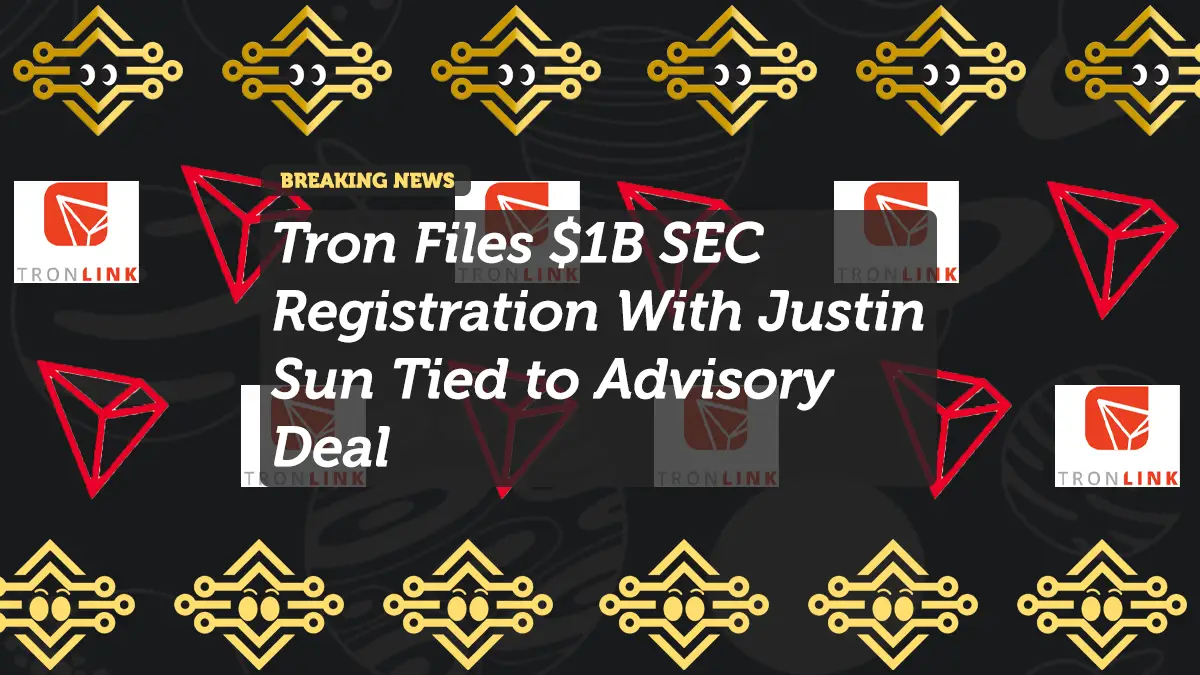
Tron Files $1B SEC Registration With Justin Sun Tied to Advisory Deal
The Tron SEC registration filing represents a watershed moment for the TRX ecosystem. On July 10, 2025, Tron Foundation submitted a $1 billion registration statement with the U.S. Securities and Exchange Commission, signaling a major shift in its regulatory strategy.
This filing comes alongside an unexpected development: Justin Sun, founder of Tron, has entered a formal advisory agreement with the SEC as part of the registration process. Under the terms, Sun will provide technical expertise while maintaining operational independence—a first for a major cryptocurrency founder.
Details of the $1 Billion Registration
The Tron SEC registration filing covers multiple aspects of the Tron ecosystem:
- TRX token sales and distribution
- USDT stablecoin operations on Tron
- Decentralized exchange (JustSwap) offerings
- NFT marketplace (APENFT) activities
Importantly, the filing explicitly states that TRX is being registered as a utility token rather than a security. This classification aligns with the SEC’s recent framework announcement that distinguishes between different token types based on functionality.
Justin Sun’s Advisory Role Raises Eyebrows
Justin Sun’s advisory agreement with the SEC has generated significant discussion in the crypto community. The arrangement sees Sun providing technical guidance on blockchain architecture and tokenomics while the SEC maintains regulatory oversight.
This unprecedented collaboration suggests the SEC recognizes Sun’s expertise while ensuring Tron’s operations comply with U.S. regulations. Notably, Sun will continue to lead Tron’s development but must consult with SEC-appointed advisors on major protocol changes affecting U.S. users.
Impact on USDT and Stablecoin Regulation
The registration has major implications for USDT on Tron. With over 70% of all USDT transactions occurring on Tron’s network, this filing could establish a regulatory template for stablecoins operating across multiple blockchains.
Tether has confirmed it will work with Tron to ensure USDT operations comply with the new framework. This collaboration could accelerate broader regulatory clarity for stablecoins—a critical missing piece in crypto regulation.
Market Reaction to the News
The crypto market responded positively to the Tron SEC registration filing. TRX surged 28.5% within 24 hours of the announcement, reaching $0.145—the highest level since January 2025.
More significantly, trading volume on Tron-based DEXs increased by 140%, indicating renewed institutional interest. Binance reported a 37% increase in new accounts specifically interested in TRX and USDT trading pairs.
Why This Matters for the Broader Crypto Industry
The Tron filing represents the first major registration under the SEC’s new regulatory framework. Unlike previous enforcement actions, this proactive approach demonstrates how projects can work with regulators rather than against them.
This development could create a blueprint for other major blockchains seeking regulatory clarity. Ethereum, Solana, and Cardano teams have already expressed interest in similar registration pathways for their ecosystems.
Potential Challenges Ahead
Despite the positive news, challenges remain for Tron:
- Global regulatory alignment—the SEC filing applies only to U.S. operations
- Decentralization concerns—the Justin Sun advisory role raises questions about true decentralization
- Technical compliance—implementing regulatory requirements on a public blockchain presents unique challenges
The Tron team acknowledges these hurdles but believes the registration creates more opportunities than risks for long-term growth.
Institutional Interest Already Growing
Major financial institutions are watching the Tron SEC registration filing closely. Fidelity has expanded its Tron research team, while JPMorgan is exploring integration of Tron-based assets into its blockchain initiatives.
The registration provides the regulatory certainty institutions need to participate. As one Wall Street executive noted: “This gives us a clear pathway to engage with Tron-based assets while maintaining compliance.”
Final Thoughts: A New Era of Crypto Regulation
The Tron SEC registration filing represents a fundamental shift in the relationship between crypto projects and regulators. By working collaboratively rather than confrontationally, Tron has created a potential model for sustainable growth within regulatory boundaries.
While challenges remain, this development signals that major crypto projects can navigate the regulatory landscape successfully. As more projects follow Tron’s lead, we may see accelerated institutional adoption and mainstream integration of blockchain technology.
For investors, this news suggests Tron is positioning itself for long-term viability in the increasingly regulated crypto market—a crucial factor as the industry matures.










